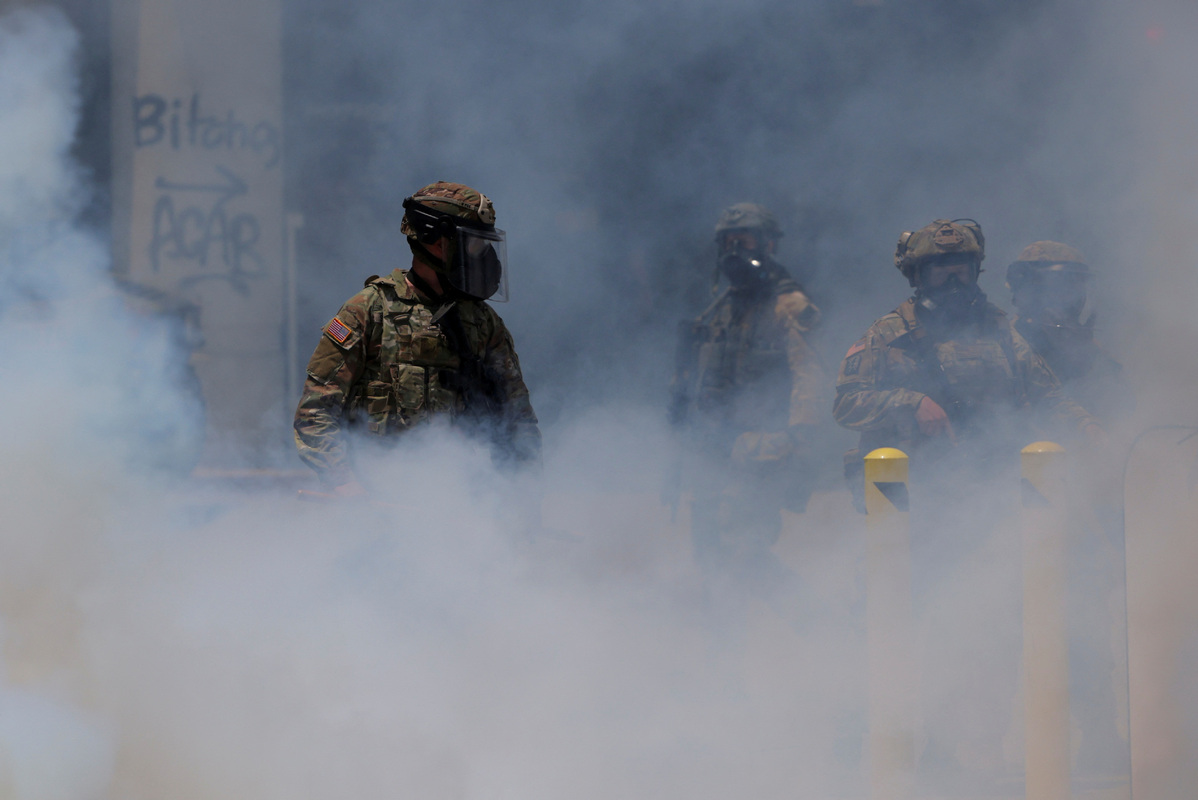'Riot' response widens partisan strife in US


Tensions in Los Angeles, and some other cities, escalated on Sunday as thousands of protesters took to the streets in response to US President Donald Trump's extraordinary deployment of the National Guard.
As law enforcement officers used tear gas, rubber bullets, and flash bangs to control the crowds, Democratic Governor Gavin Newsom requested Trump remove the Guard members in a letter on Sunday afternoon, calling their deployment a "serious breach of state sovereignty".
Their deployment appeared to be the first time since 1965 that a state's National Guard was activated without a request from its governor, a significant escalation against those who have sought to hinder the administration's mass deportation efforts, the Associated Press commented in a report.
Los Angeles mayor, Karen Bass, echoed Newsom's comments in saying in a news conference: "What we're seeing in Los Angeles is chaos that is provoked by the administration... This is about another agenda, this isn't about public safety."
White House spokesperson Abigail Jackson said in a statement in response: "It's a bald-faced lie for Newsom to claim there was no problem in Los Angeles before President Trump got involved."
In the face of rising tensions, the focus of the federal and local governments is still to blame each other, a telling sign that the protests and how they are dealt with are about more than the immigration issue itself.
It is the partisan struggle between the Democrats and the Republicans that is the root cause of the chaos.
As illegal immigration is a historical issue in the US, its solution entails systematic reforms of relevant institutions and policies. That the Republican administration has chosen to resort to a sweeping shock therapy is not only to consolidate the support of the right-wing, but also to try and take advantage of the issue to attack the Democrats, including Democratic states, such as California.
The forceful suppression ordered by the administration also indicates it is not intent on solving the problems but exacerbating the conflict. The administration's hard-line approach to quell the "riots" poses a stark contrast with its conniving support of the rioters in their storming of Capitol Hill in January 2021.
No wonder, former vice-president Kamala Harris, who lives in Los Angeles, said the immigration arrests and Guard deployment were designed as part of a "cruel, calculated agenda to spread panic and division", adding that she supports those "standing up to protect our most fundamental rights and freedoms".
The administration's approach to tackling the illegal immigration issue is directly related to its ongoing attacks on universities, among which the University of California system is a focus now, as well as its push to get its "big beautiful bill" through Congress.
The bill is fundamentally an attempt by Republicans to undo, little by little, the signature domestic achievements of the past two Democratic presidents in a bid to shake the institutional foundation for a Democrat administration in the future.
The bill is also about immigration, exposing the divide among two factions of the Republican camp — the pro-establishment tech-industry complex faction, represented by Elon Musk, and the MAGA populist faction with the vice-president as its spokesperson.
Although the bill will increase the federal government debt by $2.4 trillion in the next decade, making the US "bankrupt" as Musk warned, it allocates $155 billion for immigration enforcement and large-scale deportation plans, which is enough to make the MAGA populists ignore its potential damaging impacts.
The concerns of the "tech right" stem from both their long-standing liberal ideas and their own interests: after all, every dollar the federal government spends on debt repayment means one less dollar to invest in the so-called revolutionary technologies supported by their companies, which they believe can bring real "American vitality", as an analysis by Politico observed.
So the conflicts between the protesters in Los Angeles and the law enforcers are just a reflection of the worsening partisan struggles in the US, as well as the clique strife within the Republican camp, which will continue to split US society and influence the bifurcating evolution of US politics in the future.


































